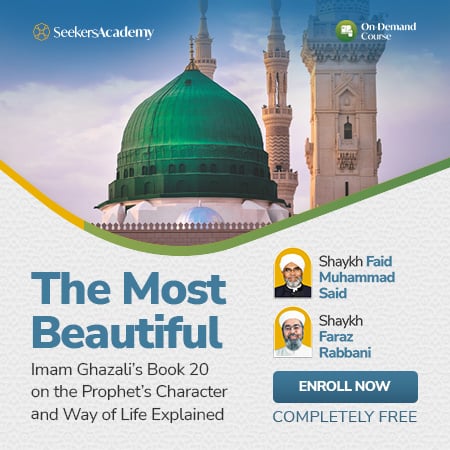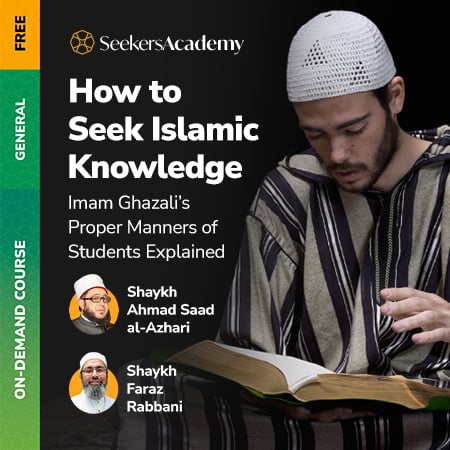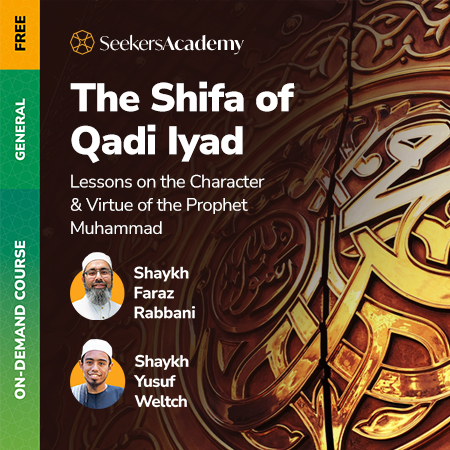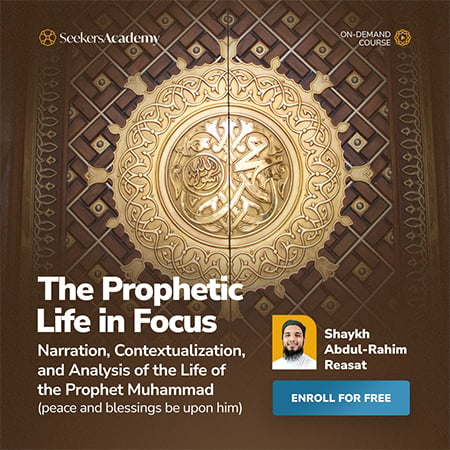
The course on the "Book of Prophetic Ethics and the Courtesies of Living" (Kitab Adab al Ma'isha wa Akhlaq al-Nubuwwa) is a study of a classic Islamic text written by Imam Ghazali. The book, "Adab al Ma'isha wa Akhlaq al-Nubuwwa," focuses on two main areas: ethical conduct in daily life and the moral qualities exhibited by the Prophet Muhammad. It combines practical guidance for individuals on how to live an ethical and virtuous life with insights into the exemplary character of the Prophet Muhammad (Blessings and Peace be upon Him).
This course offers participants the opportunity to explore and internalize the teachings of the "Book of Prophetic Ethics and the Courtesies of Living," enabling them to cultivate virtuous character traits and incorporate the Prophetic example into their daily lives.
- Teacher: Shaykh Faid Mohammed
Book 20 Of Ihya ulum al-din: In the Book of Prophetic Ethics and the Courtesies of Living (Kitab Adab al ma’isha wa-akhlaq al-nubuwwa), book twenty of the forty books which compose the Revival of the Religious Sciences (Ihya’ ‘ulum al-din), Abu Hamid al-Ghazali gives a full account of the customs and character of the Final Messenger, Muhammad (Blessings and Peace be upon Him). It is not a biography of Prophet Muhammad (Blessings and Peace be upon Him) but a roadmap for those who want to strengthen their faith, increase their knowledge and deepen their understanding of the second part of the testimony of faith, namely the first pillar of Islam.
The author details the Messenger’s noble nature and his miracles while removing doubts regarding his message. He deals with the issue of the imitation of the Prophet (Blessings and Peace be upon Him) noting that the ultimate source of knowledge is a revelation from Allah - The Exalted, which comes to us through the Messenger. The messengers of God are not merely sources of law that aim to govern the body; indeed they are a fount of spiritual nourishment for the soul, the heart and the mind. This volume lays clear that the aim of the imam in this Series is to call for a return to the Sunnah and the imitation of the Messenger in all aspects of life.
The focus is on the acts which directly influence the heart; he provides the reader with the necessary knowledge that makes up the path leading to the Hereafter. Al-Ghazali concludes that for him the truth and validity of the revelation is verified by the moral influence it exercises on the heart, mind and ultimately on the soul.
This course is for students pursuing Islamic studies at various levels, including high school, college, and university. It would provide them with a deeper understanding of ethical conduct and the virtues demonstrated by the Prophet Muhammad (pbuh).
Teachers at Islamic schools and institutions can incorporate the principles from this course into their curriculum. This would help students understand the importance of ethical conduct and how it aligns with Islamic teachings.
Youth organizations and programs can use this course to engage young Muslims in discussions about ethical behavior, character development, and the relevance of these teachings in their lives.
Adults in various professions can benefit from learning how to incorporate Prophetic ethics into their workplaces and interactions. The course can offer insights into maintaining ethical standards in challenging situations.
Anyone interested in personal growth and character development can take this course to learn from the example of the Prophet Muhammad (pbuh) and implement his teachings in their lives.
Non-Muslims interested in learning about Islamic ethics and the teachings of the Prophet Muhammad's (pbuh) character can also benefit from this course to foster understanding and respect.
- Gain a deep understanding of the ethical teachings and virtues demonstrated by the Prophet Muhammad (pbuh) by applying the principles studied to real-life situations, demonstrating the ability to make ethical decisions.
- Identify and differentiate between virtuous qualities and negative traits in light of Islamic teachings and life of the Prophet (pbuh) understanding the greatness He (pbuh) was bestowed with.
- Establish a deeper spiritual connection through understanding how ethical conduct is tied to one's relationship with Allah.
- Synthesize theoretical knowledge with practical implementation, aligning one's actions with the teachings studied.
- Advocate for positive societal change by embodying and promoting ethical behavior in the broader community.
- Cultivate self-awareness and empathy toward others, fostering positive relationships and effective communication.


